Unit4 Section B 4
新目标八年级上册unit 4 section B 短语

1. 一名优秀的钢琴演奏者an excellent piano player2. 停止笑stop laughing停止做某事stop doing sth.停下来去做某事stop to do sth.3. 一直不停地掉球keep dropping the balls一直不停地做某事keep doing sth.4. 我认识的最滑稽的人the funniest person I know5. 擅长于某事/做某事be good at sth./doing sth.6. 真正地有才华be truly talented7. 变得越来越受欢迎get more and more popular8. 世界各地around the world9. 有相同特征的have ... in common10. 尽力,努力做某事try to do sth.11. 寻找look for12. ...等等... and so on13. 各种各样的all kinds of14. 弹钢琴弹得最好play the piano the best15. 唱歌唱得最动听sing the most beautifully16. 由你决定That’s up to you to decide17. 在...中发挥作用play a role in....18. 获奖get a prize19. 喜欢观看这些节目enjoy watching these shows20. 表演者的生活the lives of the performers21. 是编造的be made up22. 认真对待... take ... seriously23. 使他们的梦想成真make their dreams come true24. 最好的去处the best place to go to25. 到达get to = arrive in/at = reach26. 你可以安静地享受时光的地方the place where you can enjoy your time quietly 1. 一名优秀的钢琴演奏者an excellent piano player2. 停止笑stop laughing停止做某事stop doing sth.停下来去做某事stop to do sth.3. 一直不停地掉球keep dropping the balls一直不停地做某事keep doing sth.4. 我认识的最滑稽的人the funniest person I know5. 擅长于某事/做某事be good at sth./doing sth.6. 真正地有才华be truly talented7. 变得越来越受欢迎get more and more popular8. 世界各地around the world9. 有相同特征的have ... in common10. 尽力,努力做某事try to do sth.11. 寻找look for12. ...等等... and so on13. 各种各样的all kinds of14. 弹钢琴弹得最好play the piano the best15. 唱歌唱得最动听sing the most beautifully16. 由你决定That’s up to you to decide17. 在...中发挥作用play a role in....18. 获奖get a prize19. 喜欢观看这些节目enjoy watching these shows20. 表演者的生活the lives of the performers21. 是编造的be made up22. 认真对待... take ... seriously23. 使他们的梦想成真make their dreams come true24. 最好的去处the best place to go to25. 到达get to = arrive in/at = reach26. 你可以安静地享受时光的地方the place where you can enjoy your time quietly。
2024年秋季新人教版七年级上册英语课件 Unit4 课时4 Section B(1a-2b)

Music
Maths
1)
1)
2)
2)
3)
3)
4)
4)
2a Read the passage on P48 and outline.
I can talk about
1. Something about me I am from….
2. The subjects at school This term, I have…
针对练习 1. 我们有各种课程。 We have __a_l_l _k_in_d_s__o_f____ subjects. 2. 他来自中国,但是会说法语。
He __is_f_r_o_m____China but he can speak__F_r_e_n_c_h____. 3. 他善于解决数学问题。
1a What’s your class schedule today? Write down the subjects.
Class(AM) Subject
Class(PM) Subject
1
maths
5
music
2
English
6
IT
3
Chinese
7
P.E.
4
biology8art Nhomakorabea1b
Before reading
Class (AM) Subject Class (PM) Subject
1234 5678
In the morning, we have… In the afternoon, we have…
Look at the picture on the left. What’s his class schedule on Monday? What subjects does they have on Wednesday?
人教版初中英语八年级上册Unit4 Section B(3a-Self Check)教案和教学反思

教学环节
Step 1 Lead-in ( PPT 3-9)
教学过程(表格描述) 主要教学活动
1. Ask Ss to translate the phrases and then make sentences. 2. Show some pictures to Ss to learn the comparatives and superlatives of the words. 3. Read them. Lead in 3a.
设置意图
复习本单元所学的重 点短语和结构以及形 容词和副词的最高 级,为本节课的写作 提供话题素材。
Step 2 Presentation (PPT 10-11)
Step 3 Writing (PPT 12-18)
Step 4 Practice (PPT 19-20)
Step 5 Self Check (PPT 21-25)
本节课的作业主要写 一篇关于超市的调查 报告。以此来练习写 作本单元的主要话 题。
Unit 4 What’s the best movie theater? Section B(3a-Self Check)
板书设计
Sample: I live in a small town. I like my town. The best school is No. 1 Middle School because it is the most beautiful school in my town. The best supermarket is New Century Supermarket because it has the best quality things and the best service.
人教版英语九年级全册Unit4 SectionB(1a-1e)优质课教案

Unit4 SectionB〔1a-1e〕优质课教案一、教学目标1.语言知识目标:1〕能掌握以下单词:ant, insect2)能掌握以下重难句子:used to like…, but now…2.能力目标:本课时的话题非常接近学生的现实生活,谈论过去的生活是学生较喜欢、较乐于去交流的话题。
通过本课时的学习,引导学生学会使用讨论合作、信息采集、比拟等学习策略。
3.情感态度价值观目标:让学生明白事物是在不断开展、变化的道理,培养学生积极向上的心态。
二、教学重难点1.教学重点:1〕掌握本课时出现的生词及用法。
2〕进展听力训练,提高综合听说能力。
3〕阅读听力材料,获得相关信息,提高学生们的综合阅读能力。
2.教学难点:1〕听力训练。
2〕阅读听力材料的短文并完成相关要求。
三、教学过程Step1. Warming-up (3mins)1. Let the students listen to a song—I wonder. After listening to it, ask the students to find the sentences about “used to〞.2. Ask “What did you use to do when you were a child?〞.Help the Ss answer “I used to … when I was a child.〞.Step2. Lead in (2mins)Show two pictures. Ask the students to make sentences with the patterns “used to like…, but now…〞.In the past now in the past nowVS VSchocolate fruit watch TV take a walk Step 3. Writing (10mins)Work on 1a.1. Ss look at the pictures in 1a. Try to understand the activities.______ P.E. class ______ painting pictures______ music class ______ants and other insects2. Let some Ss talk about the activities they used to like or dislike.Work on 1b:1. Let Ss try to write some sentences. Then discuss with their partners.e.g. I used to like painting pictures when I was a child.2. Let some Ss write their sentences on the Bb.3. Check the answers.Step 4. Listening (10mins)Work on 1c:1. Tell Ss to read the sentences in 1c and try to understand the meaning of them.1) ______ I didn’t use to like tests.2) ______ We used to walk to school.3) ______ I used to hate P.E. class.4) ______ I used to be on the soccer team.2. Play the recording for the Ss. Ss just listen for the first time. Play the recording again and check the sentences Ss hear.3. Check the answers.Work on 1d:1. Let Ss read the sentences in 1d first. Tell Ss to listen again and fill in the blanks with the right words.GirlBoy2. Play the recording again for the Ss to listen and write the words.3. Ss listen to the recording carefully and try to write the right words.4. Check the answers with the class.Step 5. Read and answer (5mins)Read the typescript of 1c and answer the questions.Girl: My six-year-old brother started school this week.Boy: Oh, that’s good. Life was great when I was six.Girl: Really? Why?Boy: Oh, school was really easy.Girl: Not for me. I didn’t use to like tests. Now I don’t worry about tests, but I really used to be very nervous about them.Boy: But the tests in primary school were easy!Girl: Well, yes, they weren’t too difficult. But I guess I wasn’t used to them yet. I think I still like high school more than primary school.Boy: But we used to play every day after school. Now we just study all the time. Girl: Yeah, but we used to have to wear the school uniform. Now we can wear whatever we like.Boy: I don’t mind wearing a school uniform. I don’t like thinking about what to wear every day! I do remember one bad thing about primary school though. I used to hate P.E. class. Now I love it.Now answer the questions:1. Did the girl use to like tests when she was six?2. What does the boy think of the tests in primary school?3. What did the boy think of the school uniform in primary school?Step 6. Pair work (4mins)Work on 1e1. Read the examples.2. Make conversations with a partner, and compare yourself with your partner.3. Ask some pairs to make conversations.Step7 Summary (1min)Sum up the sentences patterns: used to do, used to like…, but now…Step8 Exercises (3mins)1.我以前喜欢在公众前演讲。
人教版英语九年级全一册教案:Unit4 SectionB(1a-1e)

Unit4SectionB(1a-1e)教案【教材版本与册数】新目标人教版九年级上册【单元名称】Unit4I used to be afraid of the dark.【课时】Section B1a-1e(第4课时)【课型】Listening and speaking(听说课)【本单元话题】围绕“我们发生了怎样的变化”为话题,谈论“过去经常有的习惯”。
【本单元重点掌握目标】理解、掌握和运用used t o结构。
【教材内容拆分分析】Section B在Section A的话题基础上进行延伸和拓展。
主要围绕“过去的爱好”而进行,从听、说“过去的学校生活”到对“过去行为”的读、写进行了语言综合性的训练。
1a-1b进一步拓展丰富了本单元的话题内容,同时为后面听力活动进行预热。
1c-1d第三次听力输入,在Section A的基础上语言难度加大,语言更丰富。
1e要求学生在就所听内容与同伴交流。
【通过本单元的学习学生需掌握哪些综合技能】1.需理解、掌握和运用描写外貌、性格和爱好的生词和短语;需理解、掌握和运用use d t o结构。
2.能在听力练习中能够捕捉有关人物生活变化方面的细节信息。
教材分析 3.运用used t o描述过去的形象,性格,爱好及经历。
4.能够通过新旧对比,学会关注他人的变化和关心他人,领悟人生的转折和把握命运的方法。
5.需利用了略读、跳读、上下文语境或句子前后关系猜词的方式进行阅读,提高阅读理解的有效性。
第1页教学目标语言知识目标:1.通过教师自身的情景式导入和与学生互动的问答形式,学习和巩固该话题下的词汇句型,激发调动学生的求知欲,熟练使用以下词汇、短语和句型:单词:ant,insect短语:hat e P.E class,worry about,on the soccer team,be nervous a bo u t句型:掌握描述或询问人物过去的行为习惯、爱好的表达方式。
例如:I used t o be nervous a bout tests all the time.I used to hat e P.E.class.语法:正确使用used t o结构。
新版新视野大学英语第一册Unit4 SectionB单词和例句

新视野大学英语读写教程(第二版)第一册单词表Unit 4 Section B Body LanguageNew Words<1>statement n. [C] sth. one says or writes 说法,叙述;声明The minister will make a statement tomorrow on the new educational plans. 部长明天将就新的教育计划发表一项声明。
In a statement, the paper admitted that it had given incorrect information. 在一份声明中,这家报纸承认他们提供了不正确的信息。
<2>snap a. done quickly and suddenly 匆忙的,仓促的A snap judgment will not do in that case. 在那种情况下,仓促下判断是不行的。
He always makes snap decisions and never thinks about their consequences. 他总是仓促作出决定,从来不考虑后果。
<3>judgment n. (BrE judgement)1. [C, U] an opinion 看法,意见;判断In his judgment, the red trousers can't match the green shirt. 在他看来,那条红裤子与那件绿衬衣不相配。
It's too soon to make a judgment about what the result will be. 现在就结果做出判断还为时过早。
2. [U] the ability to make wise decisions about what to do and when to do it 判断力;识别力He always shows excellent judgment in his choice of staff. 他在选择员工方面总显示出非凡的判断力。
初中英语人教新目标(九年级全册)unit4sectionB优秀教学设计
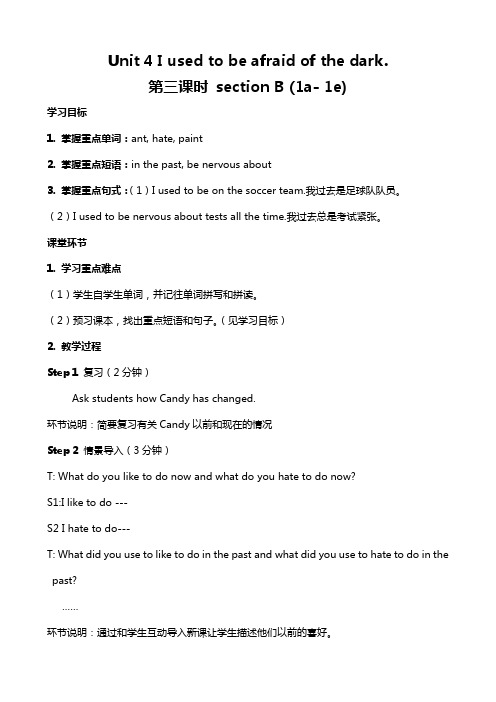
Unit 4 I used to be afraid of the dark.第三课时section B (1a- 1e)学习目标1. 掌握重点单词:ant, hate, paint2. 掌握重点短语:in the past, be nervous about3. 掌握重点句式:(1)I used to be on the soccer team.我过去是足球队队员。
(2)I used to be nervous about tests all the time.我过去总是考试紧张。
课堂环节1. 学习重点难点(1)学生自学生单词,并记往单词拼写和拼读。
(2)预习课本,找出重点短语和句子。
(见学习目标)2. 教学过程Step 1复习(2分钟)Ask students how Candy has changed.环节说明:简要复习有关Candy以前和现在的情况Step 2情景导入(3分钟)T: What do you like to do now and what do you hate to do now?S1:I like to do ---S2 I hate to do---T: What did you use to like to do in the past and what did you use to hate to do in the past?……环节说明:通过和学生互动导入新课让学生描述他们以前的喜好。
Step 3 完成教材1a---1e的任务。
1. 1a学生在代表其小时候喜欢做的事情的图片前做记号,并相互将来。
(2分钟)案例:I used to like P.E. class in the past.2. 1b.1e 学生在1a 方框中再多写几项其小时候喜欢做的事情,然后看同伴所喜欢的是不是自己所喜欢的,模仿1e的对话进行比较,练习会话(5分钟)3. 1c. 学生听听力材料,找出听到的句子(5分钟)4.1d. 学生再听听力材料,根据所听内容填空(5分钟)课堂资料包Step 1重难解析1. I used to be on the soccer team.on the soccer team.加入了足球队更多例子I am on the school basketball team.我加入了学校篮球队。
英语人教版九年级全册Unit4 SectionB
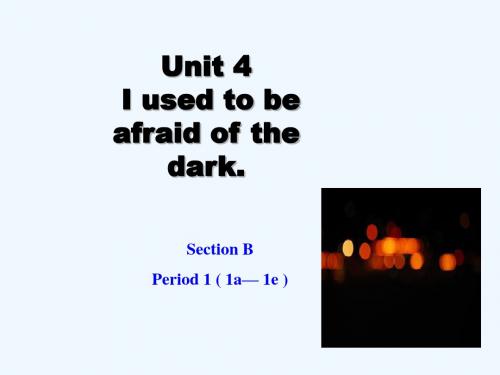
dark.
Section B Period 1 ( 1a— 1e )
Enjoy a song Days of My Past.
Talk about the pictures using used to and now.
How about your childhood? Did you use to have the same experience as thefollowing?
It’s rather cold in most of South China ___C___ in spring.
A. on time
B. at a time
C. at times
D. all the time
on time按时, at a time一次, at times有 时, all the times 总是。
1e Compare yourself with your partner.
I used to be nervous about tests all the time. What about you?
Yes, me too. And I used
to …
Compare yourself with your partner.
A: I used to … B: …
Compare yourself with your partner.
A: I used to … B: …
You are in Grade 9 now. Is your life quite different from before?
Homework
Write a short passage about your parents' childhood 1.What did your parents use to do when they were children? 2.How is it different from what you do now?
新目标九年级英语四单元SectionB短语

Unit 4 Section B1.hate sb/sth讨厌某人、某物hate to do sth/doing sth讨厌做某事2.be on the soccer team在足球队3.be nervous about sth/doing sth对某事或做某事感到紧张4.a normal 15-year-old boy一个正常的十五岁男孩5.It is hard to believed that难以相信----6.cause problems引起(发)问题7.move to搬迁到move---to---- 把---搬到---8.look for寻找9.take care of=look after照顾,照料10.miss sb so much非常想念某人11.feel lonely感到孤独12.influence sb/sth影响某人、某事have influence on对---有影响13.become interested in sth/doing sth对某事或做某事产生兴趣become less interested in sth/doing sth对某事或做某事没有兴趣14.be absent from class逃课15.make friends交朋友16.advise sb to do sth建议某人做某事give sb some advice on sth/doing sth给某人提出关于某事或做某事的建议17.talk with和---交谈18.in person亲自19.take a 24-hour train乘坐24小时的火车20. a 5-hour bus ride 五小时的汽车行程21.even though尽管22.be always doing s总是在做某事th23.take pride in= be proud of以---而自豪24.have a communication with sb和某人沟通25.be active in sth/doing sth对某事或做某事积极26.be worried about担心、担忧27.make a decision作出决定28.in the last/past few years在最近的或过去的几年里29.remain/stay/keep silent保持沉默30.tell jokes讲笑话31.requir sb to do sth请求或要求某人做某事be required to do sth被要求做某事。
unit4sectionB单词
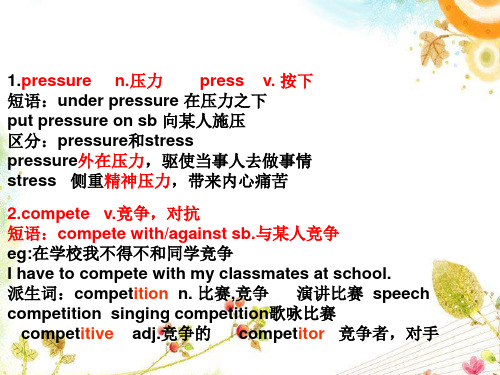
work travel
stay at home
• How do people spend their vacation? We • 加首尾 made a survey and here is our report.
加(add)
• the 总分总 ( beginning)
• A lot of people travel. Some people stay at home. Some other people visit friends or parents. A few people work.
pare
v. 比较
短语 compare A with B 把A和B做比较
compare A to B 把A比作B eg:他家很富有,我们不能把我们家和他家相比 。 His family is rich. We can't compare our family with his. 莎士比亚把世界比作舞台
work travel
stay at home
List key points
visit friends or parents
1.A lot of people travel. 2.Some people stay at home. 3.Some other people visit friends or parents. 4.A few people work. Enjoy your vacation.
1. Cross-question(审题)
调查报告,记叙文 Style (体裁):__________ 第三人称 Person(人称):_________ 一般现在时 Tense(时态): _________________
人教版九年级英语上册教学课件:Unit4 Section B(共18张PPT)
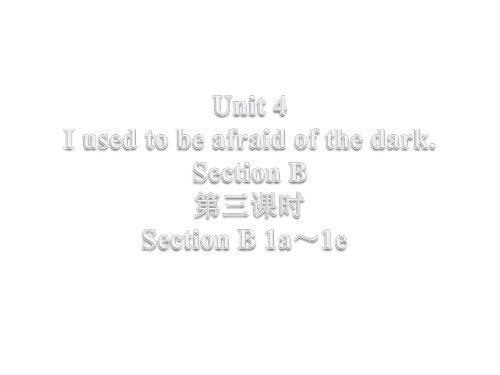
2.否定句:didn’t use to do sth. 过去不做某事 如:I didn’t use to be shy. 我过去不害羞。 。
3.反意疑问句: (1)ed to do sth., didn’t sb.? (2)Sb.didn’t use to do sth., did sb.? 如:Paula used to be short, didn’t she?
课文导学
Li Wen is a normal 15-year-old boy … 李文是一个普通的15岁的男孩……
a 15-year-old boy意为“一个15岁的男孩”, 相当于“The boy is 15 years old.”。 如:Fifteen-year-old teenagers are not allowed to drive a car.
课前导学
话题目标 我们所发生的变化
重点单词
ant n. 蚂蚁 seldom adv. 不常;很少 influence v. & n. 影响 absent adj. 缺席;不在 fail v. 不及格;失败;未能(做到) examination n.考试;审查 exactly adv.确切地;精确地
disabled father.
A. three-year-old B. three years old
C. three-years-old D. three year old
单元语法归纳
used to 过去常常 1.肯定句:used to do sth. 过去常常做某事 如:I used to be shy. 我过去很害羞。
?
A. did he B. didn’t he
人教版英语七年级上册期末高频考点专题突破Unit4 SectionB
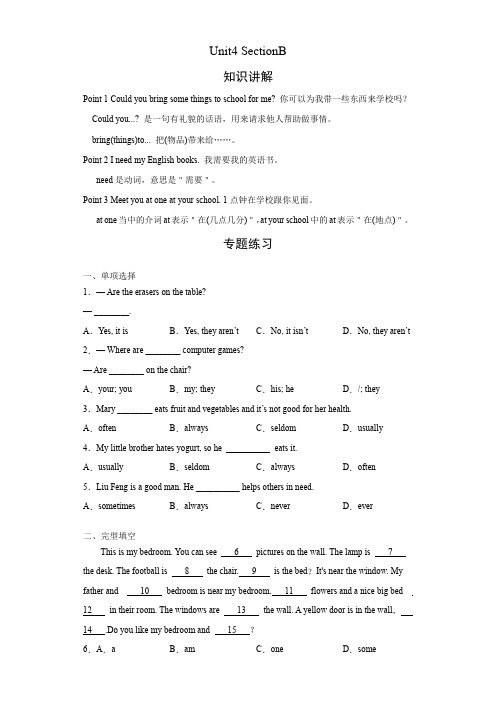
Unit4 SectionB知识讲解Point 1 Could you bring some things to school for me? 你可以为我带一些东西来学校吗?Could you...? 是一句有礼貌的话语,用来请求他人帮助做事情。
bring(things)to... 把(物品)带来给……。
Point 2 I need my English books. 我需要我的英语书。
need是动词,意思是"需要"。
Point 3 Meet you at one at your school. 1点钟在学校跟你见面。
at one当中的介词at表示"在(几点几分)",at your school中的at表示"在(地点)"。
专题练习一、单项选择1.— Are the erasers on the table?— ________.A.Yes, it is B.Yes, they aren’t C.No, it isn’t D.No, they aren’t 2.— Where are ________ computer games?— Are ________ on the chair?A.your; you B.my; they C.his; he D./; they 3.Mary ________ eats fruit and vegetables and it’s not good for her health.A.often B.always C.seldom D.usually 4.My little brother hates yogurt, so he eats it.A.usually B.seldom C.always D.often5.Liu Feng is a good man. He __________ helps others in need.A.sometimes B.always C.never D.ever二、完型填空This is my bedroom. You can see 6 pictures on the wall. The lamp is 7the desk. The football is 8 the chair. 9 is the bed?It's near the window. My father and 10 bedroom is near my bedroom. 11 flowers and a nice big bed 12 in their room. The windows are 13 the wall. A yellow door is in the wall,14 .Do you like my bedroom and 15 ?6.A.a B.am C.one D.some7.A.under B.on C.in D.behind 8.A.in B.under C.to D.for 9.A.Who B.What C.How D.Where 10.A.brother B.mother C.mother's D.brothers 11.A.the B.some C.The D.Some 12.A.is B.are C.isn't D.am 13.A.on B.behind C.in D.under 14.A.of B.here C.there D.too 15.A.their B.their's C.them D.their room三、阅读单选Miss Han: You bring(带来) many things to school, Kevin. Can you tell (告诉) me what are on your desk?Kevin: Yes, I can. There is an eraser, a ruler, three pencils and a pencil box on my desk. Miss Han: What is in your drawer(抽屉)?Kevin: In my drawer, there are two books and a notebook.Miss Han: What is that on the floor?Kevin: It is my school bag.Miss Han: Do you bring your lunch box (饭盒) to school?Kevin: Yes, I do.Miss Han: Where do you put it?Kevin: I put it under my desk.16.______ is (are) NOT on Kevin’s desk.A.An eraser B.A rulerC.A picture D.Three pencils17.______ are in Kevin’s drawer.A.Some notebooksB.Three booksC.Two notebooks and a bookD.Two books and a notebook18.______ is on the floor.A.A ruler B.An eraserC.A pen D.A school bag19.The underlined word (划线词) "put" means "______"in Chinese.A.吃B.用C.放D.买20.Kevin puts his lunch box ______ his desk.A.on B.underC.to D.in四、用所给单词的正确形式填空21.Where ________(be) your parents?22.Some________(book) are in the bookcase.23.This is my hat.___________(she) is on the bed.24.These _____________(radio) are very good.25.The computer is in my ______________(father) room.五、完成句子26.我(爱)整洁,但吉娜却不(整洁)。
人教版九年级英语全册教学设计:unit4sectionB

(二)教学设想
1.创设情境,激发兴趣:通过引入与学生生活密切相关的人物话题,激发学生的学习兴趣,使他们愿意主动参与到课堂讨论中。
2.分层教学,循序渐进:针对学生的不同水平,设计难易适度的教学活动,使每个学生都能在原有基础上得到提高。
-对于基础薄弱的学生,重点辅导时态和频率副词的用法,确保他们能够熟练掌握。
-对于基础较好的学生,引导他们关注文章结构和写作手法,提高阅读和写作能力。
3.小组合作,互动交流:鼓励学生进行小组合作,共同完成人物观察、描述和写作任务,培养学生的团队协作能力和人际交往能力。
4.案例分析,借鉴提高:选取优秀的人物描写文章,与学生一起分析文章结构、写作手法和语言表达,引导学生从中汲取写作经验。
二、学情分析
九年级的学生已经具备了一定的英语基础,他们对英语学习有较高的兴趣,但在语言运用方面仍存在一定的困难。在本章节的学习中,学生将面临以下挑战:
1.对一般现在时和一般过去时的运用不够熟练,需要教师在教学过程中进行针对性指导。
2.频率副词的使用较为生疏,需要在实际语境中进行大量练习,以提高学生的运用能力。
2.让学生回顾自己在课堂上的表现,分享学习收获,反思学习过程中遇到的困难。
3.教师强调本节课的情感态度与价值观目标,提醒学生尊重和理解他人,学会用积极的态度与人交往。
4.布置课后作业,要求学生运用所学知识描述一位他们熟悉的人物,巩固课堂所学。
五、作业布置
为了巩固本章节所学知识,培养学生的英语综合运用能力,特布置以下作业:
4.通过听力练习,让学生在听的过程中捕捉关键信息,学会用一般现在时和一般过去时描述人物。
配套新教材 高中英语 必修第一册 译林牛津版 UNIT 4 Section B
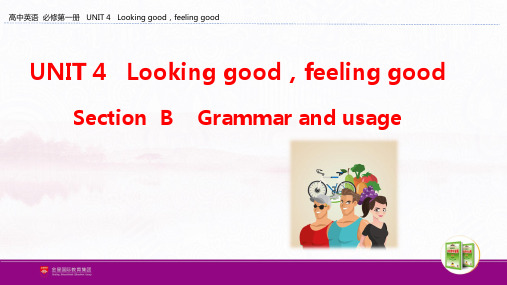
高中英语 必修第一册 UNIT 4 Looking good,feeling good
单句语法填空
பைடு நூலகம்
(1)Charlie Chaplin made great contributions to
the film industry.
(2)I make a ten-dollarcontribution(contribute) to the church every Sunday.
高中英语 必修第一册 UNIT 4 Looking good,feeling good
【归纳拓展】 in honor of 为了纪念……;为了向……表示敬意 in need of 需要 in favor of 支持 in charge of 负责,掌管 in search of 寻找 in case of 万一,以防 Tom is in charge of an organization,which is in search of children in need of help and offers them what they need. A charity party was held last week in honor of those who are in favor of the organization and contribute to it. 汤姆是一个组织的负责人,这个组织寻找需要帮助 的孩子并提 供帮助。上周举行了一个慈善聚会来向那些支持这个 组织并捐款的人士表示敬意。
(有助于成功和幸福).
happiness
(5)[词汇复现]The local government hopes that everybody living in the area will
Unit4 Section B(new)

Section B Unit 41.make / issue a statement 发表声明2.snap up sth. 抢购,抢先弄到……snap at sth. (a chance) 抓住……(机会)3. a man of judgment 有见识的人use one’s judgment 运用判断力show good judgment 展示很强的判断力in one’s judgment 据某人看in my personal judgment 根据我个人的见解on one’s own judgment 按照自己的见解,独断4.for an instant 短时间,瞬间,刹那间in / on an instant 立刻,马上,the instant (=as soon as)一……就……(常作为从句的引导词)at that instant 在那时候,在那瞬间5.acquaint sb. with sth. 使某人熟悉……be / become / get acquainted with sth. /sb. 与某人见过面,认识,熟识6.on one’s good/best behavior 行为检点,表现良好7.give an estimate of 对……作出估计make an estimate 估计,做出估计8.be partial towards 对……偏心,偏袒be partial to 对……偏爱be partial in one’s judgment 判断不公平9.account for 说明……的原因,是……的原因of no account 不重要的on account of 由于,因为on no account 绝不,绝对不take account of / take … into account 考虑到,顾及,体谅10.rub off/out 擦掉,去掉rub shoulders with sb. 与……摩肩接踵,与……接近11.aggressive adj. ----- aggression n.make / commit an aggression on/upon/against sth. 对……进行侵略12.function n.function as …担任……13.aspiration n. ----- aspire v. 渴望,愿望aspire for/after/to do sth. ……的渴望/愿望,14.project vt./n.project sth. on/to sth. 把……投射到……上15.promote vt.promote … to …把……提升为……16.means n. (单复数同形)eg. Homework should not be used as a means of controlling children.家庭作业不应该用来作为控制孩子的手段。
人教版英语七年级上册 Unit 4 Section B 教案
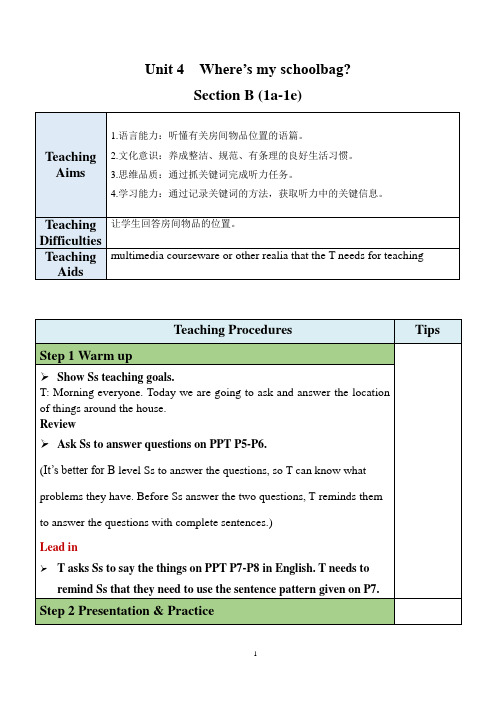
Unit 4 Where’s my schoolbag?Section B (1a-1e)1a➢Get Ss to look at the picture in 1a. Ask them to tell their partners what they can see in the picture, then match the word with thethings in the picture.Answers: 1. a 2. f 3. d 4. e 5. b 6.c➢Still work in pairs, ask Ss take turns to tell each other where the things (in 1 the picture in 1a) are.1b➢Ask Ss to look at the picture in 1a and write down all the things they remember in 1b.T: Well you have three minutes to look at the things in 1a, and then memorize them as many as you can. Now let's see who is the memory master.Answers:(After the Ss finish writing, T may want to ask Ss to exchange their answers with each other. Ask then to modify each other’s answer according to the answers given on PPT. Ss who write the most words will be the champion.)➢T shows the pictures on P12, then ask Ss to say the thing as fast as he can.(Tip: This activity is the similar to the previous one, so T can choose which activity to use.)While-listening1c➢Ask Ss to listen and circle the things Tom wants from his room. T: Tom is at school. He wants some things from his room. He is having a conversation with his mother on the phone. What does he want? Where are they? Let’s listen to the tape and circle the things Tom wants from his room.Answers: circled : English books, ruler, notebook, tape1d➢Ask Ss to listen again and write down where Tom’s things are.Unit 4 Where’s my schoolbag?Section B (2a-2c)【易混辨析】并列连词but, and 与orour pron.我们的; our 是形容词性物主代词,其后一定要接名词。
八年级上册英语期末高频考点专题突破(人教版)Unit4 SectionB
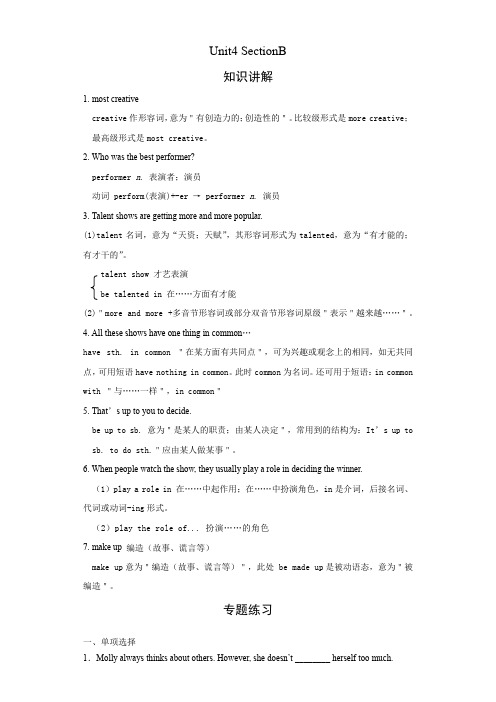
Unit4 SectionB知识讲解1. most creativecreative作形容词,意为"有创造力的;创造性的"。
比较级形式是more creative;最高级形式是most creative。
2. Who was the best performer?performer n. 表演者;演员动词 perform(表演)+-er → performer n. 演员3. Talent shows are getting more and more popular.(1)talent名词,意为“天资;天赋”,其形容词形式为talented,意为“有才能的;有才干的”。
talent show 才艺表演be talented in 在……方面有才能(2)"more and more +多音节形容词或部分双音节形容词原级"表示"越来越……"。
4. All these shows have one thing in common…have sth. in common "在某方面有共同点",可为兴趣或观念上的相同,如无共同点,可用短语have nothing in common。
此时common为名词。
还可用于短语:in common with "与……一样",in common"5. That’s up to you to decide.be up to sb. 意为"是某人的职责;由某人决定",常用到的结构为:It’s up to sb. to do sth."应由某人做某事"。
6. When people watch the show, they usually play a role in deciding the winner.(1)play a role in 在……中起作用;在……中扮演角色,in是介词,后接名词、代词或动词-ing形式。
(2)play the role of... 扮演……的角色7. make up 编造(故事、谎言等)make up意为"编造(故事、谎言等)",此处 be made up是被动语态,意为"被编造"。
人教版七年级英语下册Unit4_SectionB_语境法讲解单词
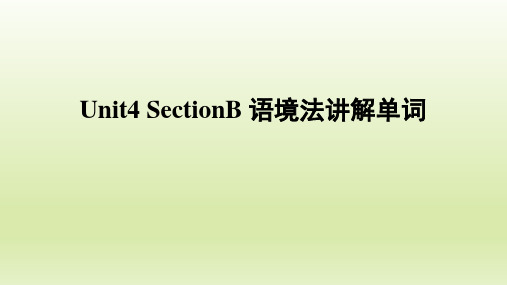
practice /'præktɪs/ v.&n. 练习
比较记忆 (practice)是名词的练习,把c更换 成s就变成了动词的练习(practise)
例句 You need to practice your manners. 你应该练习一下你的举止。
dish /dɪʃ/ n.碟;盘
比较记忆 这盘(dish)鱼(fish)味道不错。
识字
②On the front page was a large red F with a note that read, “See me
after class.”
写着
③I can’t read your writing.
读懂
熟词生义
词块拓展
read
(1) _r_e_a_d_i_n_g_r_o_o_m________ 阅览室 (2) r_e_a_d_b_o_o_ks_/_do__so_m__e _re_a_d_in_g 读书 (3) _r_e_a_d__a_lo_u_d__________ 大声朗读 (4) _r_e_a_d__q_u_ic_k_l_y________ 快速阅读 (5) _r_e_a_d__n_e_w_s_p_a_p_e_r_s____ 读报纸 (6) __r_e_a_d_o_v_e_r_/_th_r_o_u_g_h____ 仔细阅读
Unit4 SectionB 语境法讲解单词
out /aʊt/ adv. 外出
联想记忆 out倒过来写是tuo(拼音:拖) →把他拖到“外面”去。
例句 I walked out and closed the door behind me. 我走了出来,随手关了门。
词块拓展
out (1) ___h_a_n_g__o_u_t_________ 外出;闲逛 (2) ___c_o_m__e_o_u_t_________ 出版;发行 (3) ___f_in__d_o_u_t__________ 找出;查明 (4) ___g_o__o_u_t___________ 出去 (5) ___g_i_v_e_o_u_t__________ 发出,放出(热、光等) (6) ___h_a_n_d__o_u_t_________ 分发 (7) ___l_o_o_k_o_u__t _________ 小心,当心 (8) ___w__o_r_k_o_u_t_________ 算出,解决 (9) ___o_u_t__o_f _d_a_te_/_f_a_sh_i_o_n_ 过时;过期 (10) __o_u_t__o_f _w_o_r_k_______ 失业 (11) __o_u_t__o_f_m_i_n_d_______ 心不在焉
人教版八上Unit4 SectionB词汇精讲
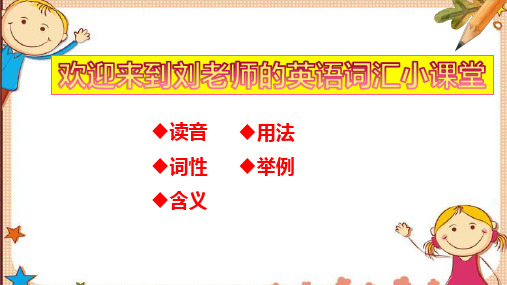
talent n. t天资;天赋
talented Destiny工作室出品
adj. 有才能的;有才干的
13540016960
be talented in (doing) sth
在某方面有天赋
have a talent for…
1.他是一个天才钢琴家. He is a __ta_le_n_t_e_d__ pianist. 2.我在做饭方面有天赋. I __a_m__ta_l_e_n_te_d___ in cooking.
各种各样的;各种类型的 beautifully /’bju:tɪfli/
magic adj. 有魔力的;有神奇力量的
1.美猴王有一个魔法棒. Monkey King has a __m_a_g_ic__ stick(棍;条). 2.他是一位来自加拿大的魔术师. He is a __m_a_g_ic_i_a_n_ from Canada.
adj. 有创造力的;创造性的
performer /pə(r)’fɔ:(r)mə(r)/
n. 表演者;演员
常在句中作表语或定语.
1.他是一个有创造力的歌手. He is a creative singer. 2.这个想法很有创造力.
The idea is very creative.
原级 creative
be up to 是…的职责;由…决定
1.这对双胞胎毫无共同之处. The twins __h_a_ve__n_o_th_i_n_g_i_n_c_o_m__m_o_n__.
2.你和你的朋友有很多共同之处吗? Do you _h_a_v_e__m_u_c_h__in__c_o_m_m__o_n_w_i_th__ your friends?
- 1、下载文档前请自行甄别文档内容的完整性,平台不提供额外的编辑、内容补充、找答案等附加服务。
- 2、"仅部分预览"的文档,不可在线预览部分如存在完整性等问题,可反馈申请退款(可完整预览的文档不适用该条件!)。
- 3、如文档侵犯您的权益,请联系客服反馈,我们会尽快为您处理(人工客服工作时间:9:00-18:30)。
1c. Wei Ming is talking with Alice about his problems, please fill in the blanks.
1. My parents are giving me too much pressure about school. 2. They want me to to get good grades. 3. I need more free time to do activities I enjoy. 4. I also keep worrying about getting better grades than my classmates.
Alice’advice:
won't get good grades if you 3. You _______ _____ _______ ______ are stressed out all the time.
1c. Wei Ming is talking with Alice about his problems, please fill in the blanks.
• Wei Ming: Alice, help me! My parents..... • Alice: Hey, Wei Ming. Although you.... You should... Ask them... • Wei Ming: It's because they..... • Alice: But life shouldn't just.... Free time..... • Wei Ming: I totally..... I need more.... This can help me... • Alice: Yes, you won't get.....if... • Wei Ming: I also keep... • Alice: oh, you shouldn't compete.... You should ... • Wei Ming: You're right. Thanks...
• To lower my stress, what I like best is ....
• I also enjoy....
• Howerer, sometimes I prefer to....
1c. Wei Ming is talking with Alice about his problems, please fill in the blanks.
Alice’advice:
compete ________ 4. You shouldn't ________ with your classmates to get better grades. be helping each You should all _______ ________ improve other to ________.
1. My parents are giving me t___ oo ____ much ______about school. pressure good _______. grades 2. They want me to to g___ et _____ 3. I need more free time to do a______ ctivities ____ I enjoy ______. 4. I also k_____ eep _______ worrying about g_____ etting _____ better _______ grades than my classmates.
______ play sports ______hang out with friends ______talk to parents or other family members ______ spend time alone ______ play computer games ______ read books ______ watch movies
1c. Wei Ming is talking with Alice about his problems, please fill in the blanks.
1. My parents are giving me too much pressure about school. 2. They want me to to get good grades. 3. I need more free time to do activities I enjoy. 4. I also keep worrying about getting better grades than my classmates.
Alice’advice:
unhappy 1. Although you may ______ be _______ ______ with your parents, you _____ should_____ _____ why they give _____ so ______ much pressure you _____ ________.
Unit 4
Why don’ t you talk to your parents?
1a What activities do you like to do to help lower your stress? Order them [1-8] with 1 being the most favorite thing you do to lower stress.
1. My parents are giving me too much pressure about school. 2. They want me to to get good grades. 3. I need more free time to do activities I enjoy. 4. I also keep worrying about getting better grades than my classmates.
Alice’advice:
be 2. But life shouldn't _________ ______ about activities grades. ________ ________ Free time ________ like sports and ________ hanging _______ out with friends are important, too. _______
Homework
Write a letter to the magazine to express your stress from shool.
Four students in a group to talk about different stress from study, parents, friends,teachers and choose one group leader to be a repoter, please do a survey about your group members' stress and others'advice, then give us a report. Let's choose the best reporter.
